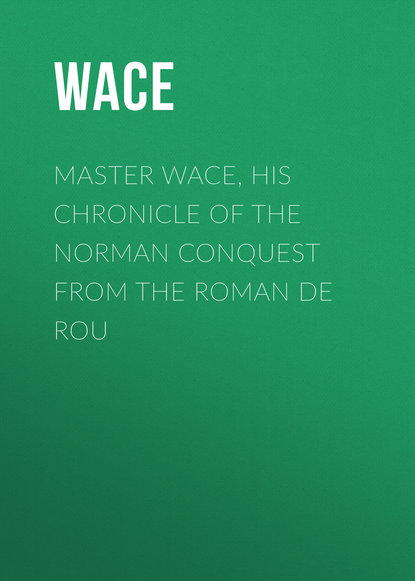 Полная версия
Полная версияMaster Wace, His Chronicle of the Norman Conquest From the Roman De Rou
The varlets who were set to guard the harness began to abandon it, as they saw the loss of the Frenchmen, when thrown back upon the fosse without power to recover themselves. Being greatly alarmed at seeing the difficulty in restoring order, they began to quit the harness, and sought around, not knowing where to find shelter. Then Odo, the good priest, the bishop of Bayeux, galloped up, and said to them, "Stand fast! stand fast! be quiet and move not! fear nothing, for if God please, we shall conquer yet." So they took courage, and rested where they were; and Odo returned galloping back to where the battle was most fierce, and was of great service on that day. He had put a hauberk on, over a white aube; wide in the body, with the sleeve tight; and sat on a white horse, so that all might recognise him. In his hand he held a mace, and wherever he saw most need, he led up and stationed the knights, and often urged them on to assault and strike the enemy.
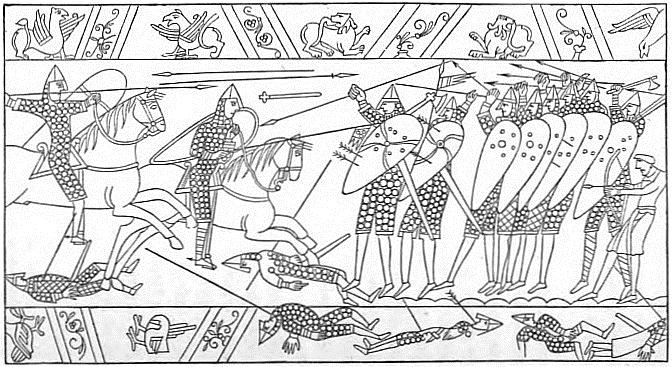
CHAPTER XXI.
HOW THE ARCHERS SMOTE HAROLD'S EYE; AND WHAT STRATAGEM THE NORMANS USED
From nine o'clock in the morning, when the combat began, till three o'clock came, the battle was up and down, this way and that, and no one knew who would conquer and win the land215. Both sides stood so firm and fought so well, that no one could guess which would prevail. The Norman archers with their bows shot thickly upon the English; but they covered themselves with their shields, so that the arrows could not reach their bodies, nor do any mischief, how true soever was their aim, or however well they shot. Then the Normans determined to shoot their arrows upwards into the air, so that they might fall on their enemies' heads, and strike their faces. The archers adopted this scheme, and shot up into the air towards the English; and the arrows in falling struck their heads and faces, and put out the eyes of many; and all feared to open their eyes, or leave their faces unguarded.
The arrows now flew thicker than rain before the wind; fast sped the shafts that the English call 'wibetes'216. Then it was that an arrow, that had been thus shot upwards, struck Harold above his right eye, and put it out. In his agony he drew the arrow and threw it away, breaking it with his hands: and the pain to his head was so great, that he leaned upon his shield. So the English were wont to say, and still say to the French, that the arrow was well shot which was so sent up against their king; and that the archer won them great glory, who thus put out Harold's eye.
The Normans saw that the English defended themselves well, and were so strong in their position that they could do little against them. So they consulted together privily, and arranged to draw off, and pretend to flee, till the English should pursue and scatter themselves over the field; for they saw that if they could once get their enemies to break their ranks, they might be attacked and discomfited much more easily. As they had said, so they did. The Normans by little and little fled, the English following them. As the one fell back, the other pressed after; and when the Frenchmen retreated, the English thought and cried out, that the men of France fled, and would never return.
Thus they were deceived by the pretended flight, and great mischief thereby befell them; for if they had not moved from their position, it is not likely that they would have been conquered at all; but like fools they broke their lines and pursued.
The Normans were to be seen following up their stratagem, retreating slowly so as to draw the English further on. As they still flee, the English pursue; they push out their lances and stretch forth their hatchets: following the Normans, as they go rejoicing in the success of their scheme, and scattering themselves over the plain. And the English meantime jeered and insulted their foes with words. "Cowards," they cried, "you came hither in an evil hour, wanting our lands, and seeking to seize our property, fools that ye were to come! Normandy is too far off, and you will not easily reach it. It is of little use to run back; unless you can cross the sea at a leap, or can drink it dry, your sons and daughters are lost to you."
The Normans bore it all, but in fact they knew not what the English said; their language seemed like the baying of dogs, which they could not understand. At length they stopped and turned round, determined to recover their ranks; and the barons might be heard crying DEX AIE! for a halt. Then the Normans resumed their former position, turning their faces towards the enemy; and their men were to be seen facing round and rushing onwards to a fresh melée; the one party assaulting the other; this man striking, another pressing onwards. One hits, another misses; one flies, another pursues: one is aiming a stroke, while another discharges his blow. Norman strives with Englishman again, and aims his blows afresh. One flies, another pursues swiftly: the combatants are many, the plain wide, the battle and the melée fierce. On every hand they fight hard, the blows are heavy, and the struggle becomes fierce.
The Normans were playing their part well, when an English knight came rushing up, having in his company a hundred men, furnished with various arms. He wielded a northern hatchet217, with the blade a full foot long; and was well armed after his manner, being tall, bold, and of noble carriage. In the front of the battle where the Normans thronged most, he came bounding on swifter than the stag, many Normans falling before him and his company. He rushed straight upon a Norman who was armed and riding on a warhorse, and tried with his hatchet of steel to cleave his helmet; but the blow miscarried, and the sharp blade glanced down before the saddle bow, driving through the horse's neck down to the ground, so that both horse and master fell together to the earth. I know not whether the Englishman struck another blow; but the Normans who saw the stroke were astonished, and about to abandon the assault, when Rogier de Montgomeri came galloping up, with his lance set, and heeding not the long handled axe218, which the Englishman wielded aloft, struck him down, and left him stretched upon the ground. Then Rogier cried out, "Frenchmen strike! the day is ours!" And again a fierce melée was to be seen, with many a blow of lance and sword; the English still defending themselves, killing the horses and cleaving the shields.
There was a French soldier of noble mien, who sat his horse gallantly. He spied two Englishmen who were also carrying themselves boldly. They were both men of great worth, and had become companions in arms and fought together, the one protecting the other. They bore two long and broad bills219, and did great mischief to the Normans, killing both horses and men. The French soldier looked at them and their bills, and was sore alarmed, for he was afraid of losing his good horse, the best that he had; and would willingly have turned to some other quarter, if it would not have looked like cowardice. He soon, however, recovered his courage, and spurring his horse gave him the bridle, and galloped swiftly forward. Fearing the two bills, he raised his shield by the 'enarmes,' and struck one of the Englishmen with his lance on the breast, so that the iron passed out at his back. At the moment that he fell, the lance broke, and the Frenchman seized the mace220 that hung at his right side, and struck the other Englishman a blow that completely fractured his skull.
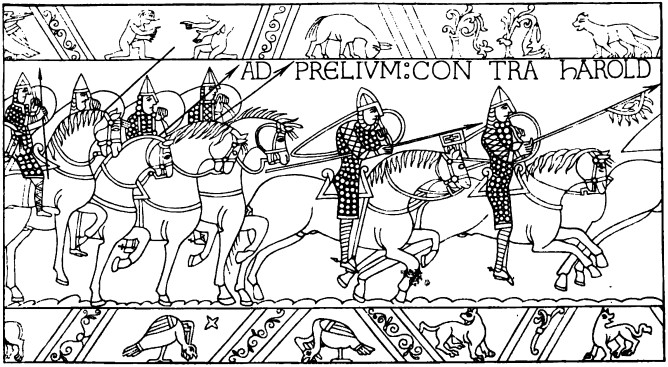

CHAPTER XXII.
THE ROLL OF THE NORMAN CHIEFS; AND THEIR DEEDS
LES NONS DE GRAUNTZ DELA LA MER
QUE VINDRENT OD LE CONQUEROUR
WILLIAM BASTARD DE GRAUNT VIGOURE221.
Old Rogier de Belmont222 attacked the English in the front rank; and was of high service, as is plain by the wealth his heirs enjoy: any one may know that they had good ancestors, standing well with their lords who gave them such honors. From this Rogier descended the lineage of Mellant. Guillame, whom they call Mallet223, also threw himself boldly into the fray, and with his glittering sword created great alarm among the English. But they pierced his shield and killed his horse under him, and he would have been slain himself, had not the Sire de Montfort224, and Dam Williame de Vez-pont225, come up with their strong force and bravely rescued him, though with the loss of many of their people, and mounted him on a fresh horse.
The men of the Beessin226 also fought well, and the barons of the Costentin; and Neel de St. Salveor227 exerted himself much to earn the love and good will of his lord, and assaulted the English with great vigour. He overthrew many that day with the poitrail of his horse, and came with his sword to the rescue of many a baron. The lord of Felgieres228 also won great renown, with many very brave men that he brought with him from Brittany.
Henri the Sire de Ferrieres229, and he who then held Tillieres230, both these barons brought large companies, and charged the English together. Dead or captive were all who did not flee before them, and the field quaked and trembled.
On the other side was an Englishman who much annoyed the French, continually assaulting them with a keen edged hatchet. He had a helmet made of wood, which he had fastened down to his coat, and laced round his neck, so that no blows could reach his head231. The ravage he was making was seen by a gallant Norman knight, who rode a horse that neither fire nor water could stop in its career, when its lord urged it on. The knight spurred, and his horse carried him on well till he charged the Englishman, striking him over the helmet, so that it fell down over his eyes; and as he stretched out his hand to raise it and uncover his face, the Norman cut off his right hand, so that his hatchet fell to the ground. Another Norman sprung forward and eagerly seized the prize with both his hands, but he kept it little space, and paid dearly for it; for as he stooped to pick up the hatchet, an Englishman with his long handled axe232 struck him over the back, breaking all his bones, so that his entrails and lungs gushed forth. The knight of the good horse meantime returned without injury; but on his way he met another Englishman, and bore him down under his horse, wounding him grievously, and trampling him altogether underfoot.
The good citizens of Rouen, and the young men of Caen, Faleise and Argentoen, of Anisie and Matoen233, and he who was then sire d'Aubemare234, and dam Willame de Romare235, and the sires de Litehare236, Touke237, and La Mare238, and the sire de Neauhou239, and a knight of Pirou240, Robert the sire de Belfou241, and he who was then sire de Alnou242, the chamberlain of Tancharvile243 and the sire d'Estotevile244, and Wiestace d'Abevile245, and the sire de Magnevile246, William whom they call Crespin247, and the sire de St. Martin248, and dam William des Molins249 and he who was sire des Pins250; all these were in the battle, and there was not one of them that did not render great aid.
A vassal from Grente-mesnil251 was that day in great peril; his horse ran away with him, so that he was near falling, for in leaping over a bush the bridle rein broke, and the horse plunged forward. The English seeing him ran to meet him with their hatchets raised, but the horse took fright, and turning quickly round brought him safe back again.
Old Gifrei de Meaine252, and old Onfrei de Bohun253, Onfrei de Cartrai254, and Maugier a newly made knight, were there also. William de Garenes255 came too, his helmet setting gracefully on his head; and old Hue de Gornai256 and together with him his men of Brai. With the numerous forces they brought, they killed great numbers.
And Engerran de l'Aigle257 came also, with shield slung at his neck; and gallantly handling his spear, struck down many English. He strove hard to serve the duke well, for the sake of the lands he had promised him. And the viscount of Toarz258 was no coward that day. And Richard d'Avrencin259 was there, and with him were the sire de Biarz260, and the sire de Solignie261, and the butler d'Aubignie262, and the lords de Vitrie263, de Lacie264, de Val de Saire265, and de Tracie266; and these forming one troop, fell on the English off hand, fearing neither fence nor fosse; many a man did they overthrow that day; many did they maim, and many a good horse did they kill.
Hugh the sire de Montfort267, and those of Espine268, Port269, Courcie270, and Jort also, that day slew many English. He who was then sire de Reviers271, brought with him many knights who were foremost in the assault, bearing the enemy down with their warhorses. Old Willame de Moion272 had with him many companions; and Raol Teisson de Cingueleiz273, and old Rogier Marmion274, carried themselves as barons ought, and afterwards received a rich guerdon for their service.
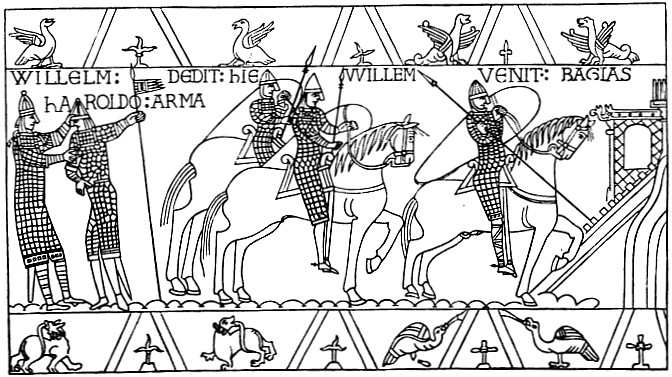

CHAPTER XXIII.
THE ROLL OF THE NORMAN LORDS CONTINUED
Next the company of Neel275 rode Raol de Gael; he was himself a Breton, and led Bretons; he served for the land which he had, but he held it short time enough; for he forfeited it, as they say276.
Avenals des Biarz277 was there, and Paienals des Mostiers-Hubert278; and Robert Bertram, who was Tort (crooked)279, but was very strong when on horseback, had with him a great force, and many men fell before him. The archers of Val de Roil280, and those of Bretoil281, put out the eyes of many an Englishman with their arrows. The men of Sole282 and Oireval283, and of St. Johan and Brehal284, of Brius285 and of Homez286, were to be seen on that day, striking at close quarters, and holding their shields over their heads, so as to receive the blows of the hatchets. All would rather have died than have failed their lawful lord.
And there were also present the lords of Saint-Sever287 and Caillie288, and the sire de Semillie289, and Martels de Basquevile290; and near him the lords of Praels291, of Goviz292 and Sainteals293, of Viez Molei294, and Monceals295; and he who was sire de Pacie296, and the seneschal de Corcie297, and a chevalier de Lacie298, with the lords de Gascie299, d'Oillie300, and de Sacie301, and the sires de Vaacie302, del Torneor303 and de Praeres304, and Willame de Columbieres, and old Gilbert d'Asnieres305, de Chaignes, and de Tornieres306, and old Hue de Bolebec307, and Dam Richart, who held Orbec308, and the sire de Bonnesboz309, and the sires de Sap, and de Gloz310 and he who then held Tregoz311; he killed two Englishmen; smiting the one through with his lance, and braining the other with his sword; and then galloped his horse back, so that no Englishman touched him.
And the sire de Monfichet312 was there, leading a gallant party; and the ancestor of Hue li Bigot313, who had lands at Maletot, and at Loges and Chanon, and served the duke in his house as one of his seneschals, which office he held in fee. He had with him a large troop, and was a noble vassal. He was small of body, but very brave and bold, and assaulted the English with his men gallantly.
And now might be heard the loud clang and cry of battle, and the clashing of lances. The English stood firm in their barricades, and shivered the lances, beating them into pieces with their bills and maces. The Normans drew their swords and hewed down the barricades, and the English in great trouble fell back upon their standard, where were collected the maimed and wounded.
Then the sire de la Haie314 charged on, and neither spared nor pitied any; striking none whom he did not kill, and inflicting wounds such as none could cure.
The lords de Vitrie315 and Urinie316, de Moubrai317 and Saie318, and the sire de la Ferté319, smote down many of the English, most of whom suffered grievously, and many of them were killed. Botevilain320 and Trossebot321 feared neither blow nor thrust, but heartily gave and took many on that day.
William Patric de la Lande322 called aloud for king Harold, saying that if he could see him, he would appeal him of perjury. He had seen him at la Lande, and Harold had rested there on his way through, when he was taken to the duke, then at Avranches, on his road to Brittany. The duke made him a knight there, and gave him and his companions arms and garments, and sent him against the Bretons. Patric stood armed by the duke's side, and was much esteemed by him.
There were many knights of Chauz323, who jousted and made attacks. The English knew not how to joust, nor bear arms on horseback, but fought with hatchets and bills. A man when he wanted to strike with one of their hatchets, was obliged to hold it with both his hands, and could not at the same time, as it seems to me, both cover himself and strike with any freedom324.
The English fell back upon a rising ground, and the Normans followed them across the valley, attacking them on foot and horseback. Then Hue de Mortemer325, with the sires d'Auviler326, d'Onebac327, and Saint-Cler328, rode up and charged, overthrowing many.
Robert Fitz Erneis329 fixed his lance, took his shield, and galloping towards the standard with his keen-edged sword, struck an Englishman who was in front, killed him, and then drawing back his sword, attacked many others, and pushed straight for the standard, trying to beat it down; but the English surrounded it, and killed him with their bills. He was found on the spot, when they afterwards sought for him, dead, and lying at the standard's foot.
Robert count of Moretoing330 never went far from the duke. He was his brother on the mother's side, and brought him great aid. The sire de Herecort331 was also there, riding a very swift horse, and gave all the help he could. The sires de Crievecoer332, Driencort333, and Briencort334, also followed the duke wherever he moved. The sires de Combrai335, and Alnei336; de Fontenei337, Rebercil338, and Molei339 challenged Harold the king to come forth, and said to the English, "Stay! stay! where is your king? he that perjured himself to William? He is a dead man, if we find him."
Many other barons there were, whom I have not even named; for I cannot give an account of them all, nor can I tell of all the feats they did, for I would not be tedious. Neither can I give the names of all the barons, nor the surnames340 of all whom the duke brought from Normandy and Brittany in his company. He had also many from Mans and Thouars; and Angevins and Poitevins; and men of Ponthieu and Bologne. He had also soldiers341 from many lands, who came some for land and some for money. Great was the host, and great the enterprize.
Duke William fought gallantly, throwing himself wherever the greatest press was, beating down many who found no rescue; so that it might easily be seen that the business in hand was his own. He who bore his gonfanon that day—Tostein342, Fitz-Rou le blanc by name, born at Bec near Fescamp—was a brave and renowned knight. He bore the gonfanon boldly, high aloft in the breeze, and rode by the duke, going wherever he went. Wherever the duke turned, he turned also, and wheresoever he stayed his course, there he rested also. And the duke fought where the greatest throng was, where he saw the most English, and wherever the Normans were attacking and slaughtering them. He also had around him a great company, vavassors of Normandy, who to save their lord would have put their own bodies between him and the enemies' blows.
Alain Fergant343, count of Brittany, lead a great company of Bretons, a bold and fierce people, who willingly go wherever booty is to be won. They wounded and killed many; and few that they struck stood their ground. Alain Fergant himself fought like a noble and valiant knight, and led his Bretons on, doing great damage to the English.
The sire de St. Galeri344, and the count d'Ou345, and Roger de Montgomeri and dam Ameri de Toarz also demeaned themselves like brave men, and those whom their blows reached were ill handled.
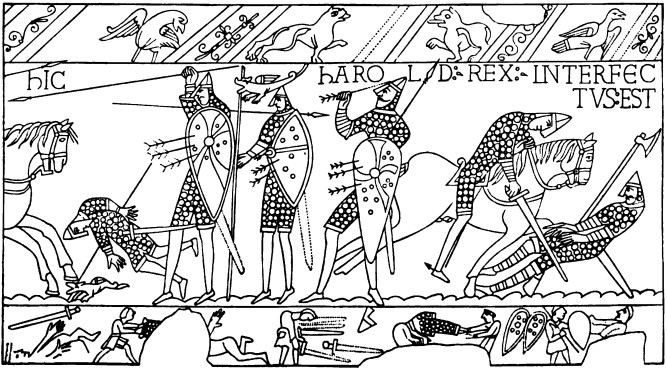
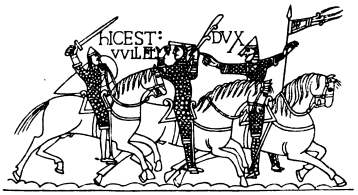
CHAPTER XXIV.
WHAT DEEDS OF ARMS DUKE WILLIAM DID; AND HOW HAROLD WAS SLAIN AND THE ENGLISH FLED
Duke William pressed close upon the English with his lance; striving hard to reach the standard with the great troop he led; and seeking earnestly for Harold, on whose acconnt the whole war was. The Normans follow their lord, and press around him; they ply their blows upon the English; and these defend themselves stoutly, striving hard with their enemies, returning blow for blow.
One of them was a man of great strength, a wrestler, who did great mischief to the Normans with his hatchet; all feared him, for he struck down a great many Normans. The duke spurred on his horse, and aimed a blow at him, but he stooped, and so escaped the stroke; then jumping on one side, he lifted his hatchet aloft, and as the duke bent to avoid the blow, the Englishman boldly struck him on the head, and beat in his helmet, though without doing much injury. He was very near falling however, but bearing on his stirrups he recovered himself immediately; and when he thought to have revenged himself on the vagabond by killing him, the rogue had escaped, dreading the duke's blow. He ran back in among the English, but he was not safe even there, for the Normans seeing him, pursued and caught him; and having pierced him through and through with their lances, left him dead on the ground.
Where the throng of the battle was greatest, the men of Kent and of Essex fought wondrously well, and made the Normans again retreat, but without doing them much injury. And when the duke saw his men fall back, and the English triumphing over them, his spirit rose high, and he seized his shield by the 'enarmes'346, and his lance, which a vassal handed to him, and took his post by his gonfanon.
Then those who kept close guard by him, and rode where he rode, being about a thousand armed men, came and rushed with closed ranks upon the English; and with the weight of their good horses, and the blows the knights gave, broke the press of the enemy, and scattered the crowd before them, the good duke leading them on in front347. Many pursued and many fled; many were the Englishmen who fell around, and were trampled under the horses, crawling upon the earth, and not able to rise. Many of the richest and noblest men fell in that rout, but still the English rallied in places; smote down those whom they reached, and maintained the combat the best they could; beating down the men and killing the horses. One Englishman watched the duke, and plotted to kill him; he would have struck him with his lance, but he could not, for the duke struck him first, and felled him to the earth.
Loud was now the clamour, and great the slaughter; many a soul then quitted the body it inhabited. The living marched over the heaps of dead, and each side was weary of striking. He charged on who could, and he who could no longer strike still pushed forward. The strong struggled with the strong; some failed, others triumphed; the cowards fell back, the brave pressed on; and sad was his fate who fell in the midst, for he had little chance of rising again; and many in truth fell who never rose at all, being crushed under the throng.
And now the Normans had pressed on so far, that at last they reached the standard348. There Harold had remained, defending himself to the utmost; but he was sorely wounded in his eye by the arrow, and suffered grievous pain from the blow. An armed man came in the throng of the battle, and struck him on the ventaille of his helmet, and beat him to the ground; and as he sought to recover himself, a knight beat him down again, striking him on the thick of his thigh, down to the bone.



